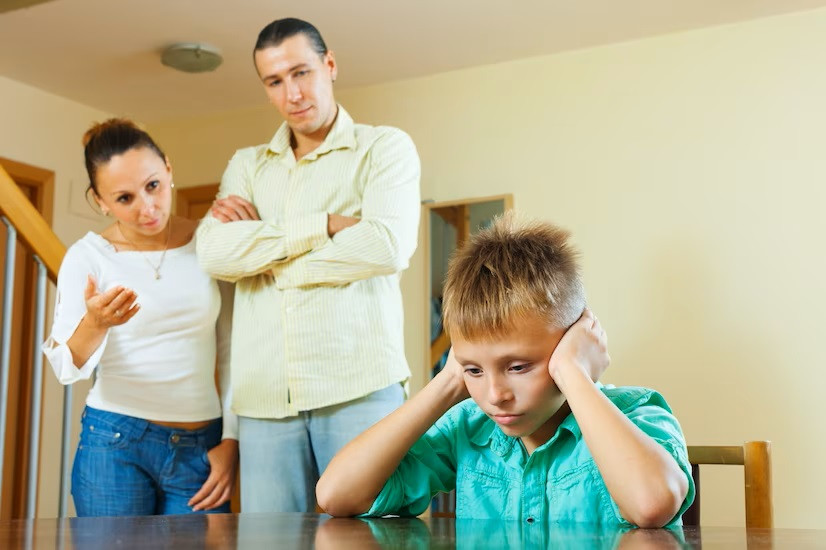It's normal to feel angry when facing situations such as being disturbed, treated unfairly, frustrated, or deceived. Your childhood experiences shape your level of anger, its expressions, and your coping mechanisms.
A person who experienced certain traumas in childhood may exhibit excessive anger and have difficulty controlling themselves, sometimes to the point of hurting others. Understanding the childhood traumas that shape a person into being easily angered is important.
Experiencing verbal abuse
Abuse of children can cause serious psychological trauma. Verbal abuse, such as insults, threats, and harsh words, can negatively impact a child's development and mental health.
Children who frequently experience verbal abuse may suffer from low self-esteem, anxiety, fear, and a loss of security. These issues can trigger mental health problems such as anxiety, depression, and PTSD in adulthood.
This trauma can ultimately affect a child's brain development and mental health as they grow up. If a child is constantly pressured, they may struggle to control their emotions, experience increased stress and anxiety, and have heightened anger responses.
Verbal abuse can also impact a child's ability to learn and develop socially, including their capacity to understand and manage emotions, resolve conflicts, and communicate effectively. They may have difficulty regulating emotions, develop aggressive behaviors, and tend to respond to situations excessively, including with anger.
Authoritarian and restrictive parenting
Children grow up modeling what their parents show and teach them. When parents raise their children in an authoritarian and fear-based manner, constantly yelling and using physical violence, the children may mimic this behavior by yelling or using violence themselves. There is a part of the child that struggles to accept what they are experiencing.
When parents fail to help their children manage emotions and difficult feelings, the children are left to cope with their emotions on their own. Parental conflicts can lead to psychological trauma for children, impacting their cognitive development in various ways. This includes challenges in understanding and handling emotions, resolving conflicts, and communicating effectively. In some cases, these experiences may contribute to heightened aggression and sensitivity in children.
Frequently feeling neglected
Children who feel neglected or receive insufficient attention and affection from their parents are likely to experience psychological trauma, leading them to become angry and aggressive adults. Neglected children may feel unappreciated, unloved, and lack a sense of security and trust in the adults around them.
Emotional or physical discomfort due to neglect can lead to various mental health issues, including depression or anxiety in adulthood.
There is no need to feel ashamed if you realize that you have also become an angry person due to childhood trauma. Childhood trauma can indeed make it particularly challenging to manage anger as an adult.
If you need medical advice or consultation, you can either visit a doctor or make use of the consultation features that are available in the Ai Care application by downloading the Ai Care application from the App Store or Play Store.
Looking for more tips and tricks for health, first aid, and other home treatments? Click here!
- Sean Edbert Lim, MBBS
Mind.org (2018). How to cope with anger. Available from: https://www.mind.org.uk/information-support/types-of-mental-health-problems/anger/about-anger/.
Andrea Brandt, PhD, MFT (2017). 4 Ways Childhood Trauma Can Affect Adults. Available from: https://www.psychologytoday.com/us/blog/mindful-anger/201706/4-ways-childhood-trauma-can-affect-adults.
Lawrence Robinson, Melinda Smith, M.A., and Jeanne Segal, Ph.D. (2023). Emotional and psychological trauma. Available from: https://www.helpguide.org/articles/ptsd-trauma/coping-with-emotional-and-psychological-trauma.htm.
Aha Parenting. What's Wrong with Strict Parenting?. Available from: https://www.ahaparenting.com/read/strict-parenting.
American Society for the Positive Care of Children. What is emotional abuse? Available from: https://americanspcc.org/emotional-child-abuse/.
Amy Morin, LCSW (2019). How Parents Fighting Could Affect a Child's Mental Health. Available from: https://www.verywellfamily.com/how-parents-fighting-affects-children-s-mental-health-4158375.
Kathryn Watson (2022). Abandonment Trauma: Effects and Symptoms in Children and Adults. Available from: https://psychcentral.com/health/abandonment-trauma.











